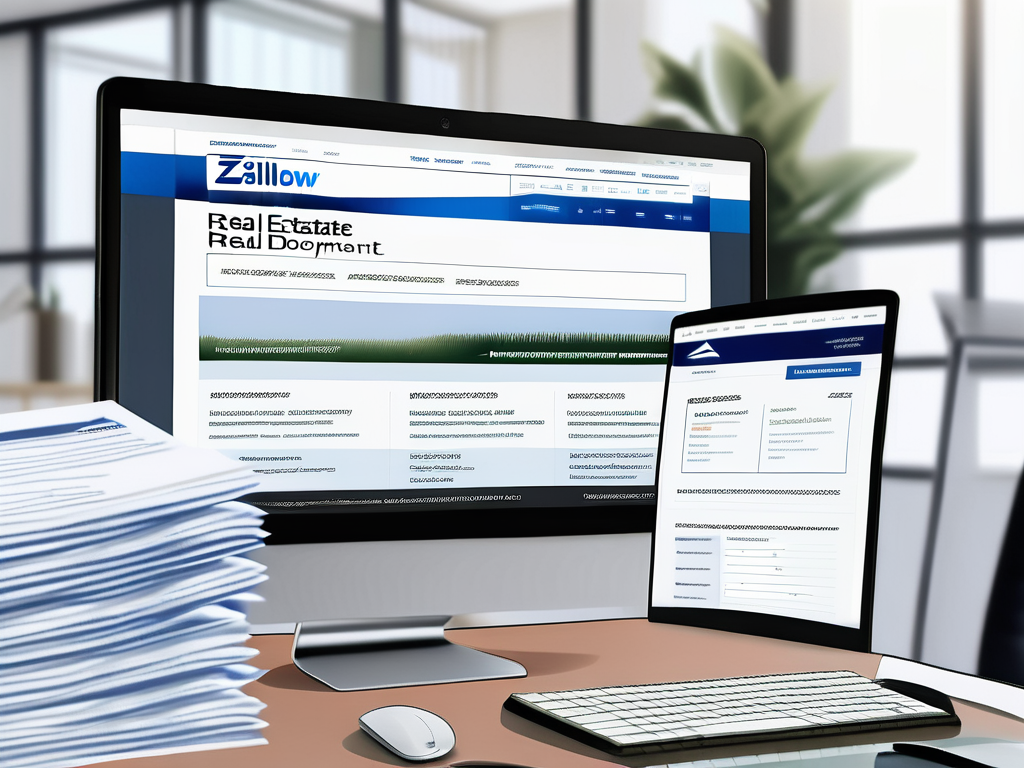Navigating Your First Online Sale with Zillow: Understanding Essential Paperwork


Selling a property online can be an exciting and convenient way to reach potential buyers quickly. With the help of platforms like Zillow, you can easily list your property and connect with interested buyers. However, before you dive into the world of online property sales, it's crucial to have a solid understanding of the essential paperwork involved. This article will guide you through the necessary steps and key terms you need to know to navigate your first online sale with Zillow successfully.
Understanding the Basics of Online Property Sale
Before we delve into the paperwork, let's start by understanding the basics of online property sales. Online platforms like Zillow revolutionize the traditional real estate market by offering a convenient way to list, market, and sell properties. These platforms connect buyers and sellers from all over the country, allowing you to reach a broader audience.

The Role of Zillow in Online Property Sales
Zillow is one of the most popular online real estate marketplaces, connecting millions of buyers and sellers every day. As a seller, Zillow provides you with a platform to create property listings, market your home, communicate with potential buyers, and manage the sale process. It offers various tools and features to make selling your property online a seamless experience.
Key Terms You Need to Know
When venturing into the world of online property sales, it's essential to familiarize yourself with some key terms. These terms will help you navigate through the process and understand the paperwork involved:
MLS Listing: The Multiple Listing Service (MLS) is a database of property listings that real estate agents use to share information with each other. Listing your property on the MLS ensures that it reaches a broader network of buyers and their agents.
List Price: The price at which you list your property for sale.
Offer: A potential buyer's proposal to purchase your property, which includes a price and terms.
Contract: A legally binding agreement between the buyer and seller that outlines the terms and conditions of the sale.
Now that you have a grasp of the essential terms, let's delve into the intricacies of the online property sales process. When listing your property on platforms like Zillow, it's crucial to provide accurate and detailed information about your home. This includes highlighting its unique features, such as a spacious backyard, modern kitchen appliances, or a recently renovated bathroom.
Furthermore, uploading high-quality photos of your property can significantly impact the interest it generates from potential buyers. A picture is worth a thousand words, and in the case of online property sales, it can be the difference between a buyer clicking on your listing or scrolling past it. Make sure to capture your home's best angles and showcase its most appealing aspects.
Once your property is listed, you may start receiving offers from interested buyers. It's essential to carefully review each offer and consider factors such as the price, contingencies, and proposed closing date. While it can be tempting to accept the highest offer, it's crucial to evaluate the overall terms and conditions to ensure a smooth and successful sale.
When you find a buyer and agree on the terms, it's time to enter into a contract. This legally binding agreement protects both parties and outlines the responsibilities and obligations of each. It typically includes details such as the purchase price, financing arrangements, inspection contingencies, and the closing date. It's essential to thoroughly review the contract and consult with a real estate attorney if needed to ensure that your interests are protected.
As you can see, online property sales offer a convenient and efficient way to sell your home. By understanding the basics, familiarizing yourself with key terms, and paying attention to the details, you can navigate the process with confidence and achieve a successful sale.
Preparing for Your First Online Sale
Now that you have a basic understanding of online property sales and the role of Zillow, let's dive into the process of preparing for your first online sale. This section will cover setting up your Zillow account and guide you through the step-by-step process of listing your property.

Setting Up Your Zillow Account
The first step in preparing for your online sale is setting up a Zillow account. Creating an account is free and straightforward. Simply visit the Zillow website and click on the "Sign Up" button. Follow the prompts to enter your information and create your account.
Once your account is set up, it's essential to complete your profile and provide accurate and detailed information about your property. This includes uploading high-quality photos, writing an engaging description, and highlighting the unique features of your home.
When completing your profile, consider adding a personal touch. Share a brief story about your experience living in the property or any fond memories you have. This can help potential buyers connect with your home on an emotional level and make it stand out among other listings.
Listing Your Property: A Step-by-Step Guide
Listing your property on Zillow is a user-friendly process. To get started, log into your Zillow account and click on the "Sell" tab. From there, you'll be guided through a step-by-step process to create your listing.
First, you'll need to input your property's details, including the number of bedrooms and bathrooms, square footage, and any recent updates or renovations. Zillow uses this information to help buyers find the most relevant properties that match their search criteria.
Take the time to provide additional details about your property that may not be included in the standard fields. For example, if your home has a beautiful backyard garden or a newly installed energy-efficient heating system, make sure to mention these features. The more information you provide, the better equipped potential buyers will be to make an informed decision.
Next, you'll determine your property's list price based on market trends, recent sales in your area, and the condition of your home. Setting an appropriate list price is crucial as it can attract or deter potential buyers.
Consider consulting with a real estate agent or doing some research to ensure you're pricing your property competitively. It's important to strike a balance between getting a fair price for your home and attracting interested buyers.
Once you've entered all the necessary details, it's time to upload high-quality photos of your property. Visuals play a significant role in attracting potential buyers, so be sure to showcase your home in the best possible light.
Consider hiring a professional photographer or using a high-quality camera to capture the essence of your home. Clear, well-lit photos that showcase each room from multiple angles can make a significant difference in generating interest and inquiries.
Lastly, write a compelling description of your property that highlights its key features, location, and any unique selling points. Be honest and accurate in your description to avoid any misconceptions when potential buyers view your listing.
Consider including specific details about the neighborhood, such as nearby amenities, schools, or parks. This can help potential buyers envision themselves living in the area and create a sense of excitement about the property.
Remember, the more effort you put into creating an informative and visually appealing listing, the higher your chances of attracting serious buyers. Take your time, pay attention to detail, and let your passion for your property shine through in your listing.
Essential Paperwork for Online Property Sale
Now that your property is listed on Zillow, it's time to shift our focus to the essential paperwork required for a successful online property sale. Having accurate and complete paperwork is crucial to ensure a smooth transaction and protect your interests as a seller.

Importance of Accurate Paperwork
Accurate paperwork is the foundation of a successful property sale. It provides a clear and concise record of the transaction's details and protects both the buyer and the seller. It's essential to be diligent in completing the necessary paperwork to avoid any legal disputes or complications down the line.
Imagine this: you've found the perfect buyer for your property, negotiated a fair price, and are ready to close the deal. But wait, without accurate paperwork, you may find yourself in a whirlwind of confusion and potential legal battles. That's why it's crucial to dot your i's and cross your t's when it comes to paperwork.
Common Documents Required for Property Sale
While the specific paperwork may vary depending on your location and the nature of the sale, some common documents are typically required for an online property sale. These include:
- Property Deed: A document that proves your ownership of the property.
- Sales Contract: A legally binding agreement between the buyer and seller that outlines the terms and conditions of the sale.
- Property Disclosure Form: A document that discloses any known defects or issues with the property.
- Inspection Reports: Reports from professional property inspectors that detail the condition of the property.
- Title Insurance: Provides protection against any unforeseen issues with the property's title.
- Closing Statement: A document that outlines the final details of the sale, including the purchase price, closing costs, and prorated taxes.
These documents form the backbone of a successful property sale. They ensure that both parties are aware of the property's condition, any potential issues, and the agreed-upon terms of the sale. Without them, the transaction could be vulnerable to misunderstandings and disputes.
For example, the property disclosure form is a critical document that protects both the buyer and the seller. It allows the seller to disclose any known defects or issues with the property, ensuring transparency and preventing future legal complications. On the other hand, the buyer can make an informed decision based on this information and negotiate repairs or adjustments if necessary.
It's important to consult with a real estate attorney or agent to ensure you have all the necessary paperwork completed accurately. They can guide you through the process, provide legal advice, and ensure that you are fully protected throughout the transaction.
Navigating the Zillow Platform
With your property listed and the essential paperwork in order, it's time to explore the various tools and features Zillow offers to help you navigate the platform effectively and attract potential buyers.
Utilizing Zillow Tools for Effective Sale
Zillow provides several tools to help sellers maximize their online property sale. These tools include:
- Zestimate: Zillow's proprietary algorithm that estimates the value of your property based on various factors including location, size, and recent sales data. While it's essential to take the Zestimate with a grain of salt, it can provide a helpful starting point when determining your list price.
- Virtual Tours: Zillow allows you to upload virtual tours of your property to give potential buyers a more immersive viewing experience. Virtual tours are a great way to showcase the layout and flow of your home.
- Contact Tools: Zillow offers various communication tools to interact with potential buyers. These tools allow you to respond to inquiries, schedule showings, and negotiate offers seamlessly.
Communicating with Potential Buyers on Zillow
Effective communication plays a vital role in the success of your online property sale. Zillow provides a messaging platform that allows you to communicate with potential buyers directly. It's crucial to respond promptly and professionally to inquiries and showcase your property's unique selling points to generate interest.
Closing the Sale: What to Expect
As potential buyers show interest in your property and submit offers, you may find yourself entering the closing phase of the sale. Understanding the closing process and your post-sale responsibilities is crucial to ensure a smooth transaction.
Understanding the Closing Process
The closing process involves several steps and can vary depending on your location and the type of sale. Generally, the process includes reviewing and accepting offers, completing any necessary inspections or repairs, finalizing financing arrangements, and preparing the necessary paperwork for the final sale.
It's important to familiarize yourself with the laws and regulations governing real estate transactions in your area. Consulting with a real estate attorney or agent can help ensure that you're following all legal requirements and protect your interests during the closing process.
Post-Sale Responsibilities and Considerations
Once the sale is finalized, you'll need to fulfill certain post-sale responsibilities and consider certain factors. These may include transferring ownership of the property, canceling any applicable insurance policies, notifying utility companies of the change in ownership, and ensuring a smooth transition for the buyer.
It's also important to evaluate your financial situation after the sale, considering any tax implications or potential reinvestment opportunities. Consulting with a financial advisor can provide you with insights and guidance tailored to your specific needs.
In conclusion, navigating your first online sale with Zillow requires a solid understanding of the essential paperwork involved. By familiarizing yourself with the basics of online property sales, preparing your listing, understanding the required documents, utilizing Zillow's tools effectively, and being aware of the closing process, you can confidently navigate the world of online property sales with Zillow.
Ready to Master the Art of Selling Your Home Online?
Embark on your selling journey with confidence by taking advantage of the resources at SmartSellersMatch.com. Our comprehensive FSBO course, available for free, is designed to equip you with the knowledge and tools necessary for a successful home sale. From a curated library of essential documents to our innovative FSBO Assistant chatbot, we're here to guide you every step of the way. Don't miss out on expert advice tailored to your needs—take the free FSBO Course today and match your smart decision to sell with our smart selling solutions!





